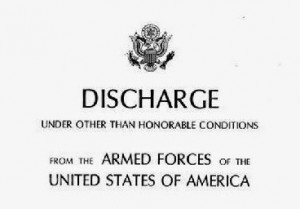Increasingly, Veterans Denied VA Care Due to Discharge Circumstances

By Debbie Gregory.
An other than honorable discharge is the military equivalent of a “scarlet letter.” Often called “bad paper,” the designation carries serious post-service consequences. A growing number of veterans have been ruled ineligible for benefits because of less-than-honorable discharges.
Former members of the military are being refused benefits at the highest rate since the system was created at the end of World War II, according to a recent report. More than 125,000 Iraq and Afghanistan veterans have what are known as “bad paper” discharges that preclude them from receiving care. But veterans with bad paper argue that their conduct was the result of post-traumatic stress disorder or traumatic brain injury.
The situation has created a unique conundrum.
“We separate people for misconduct that is actually a symptom of the very reason they need health care,” said Coco Culhane, a lawyer who works with veterans at the Urban Justice Center in New York.
The highest rate of bad paper is found in the Marine Corps, where one in 10 is now ineligible for benefits.
The Servicemen’s Readjustment Act of 1944, also known as the G. I. Bill, defined who was eligible for VA benefits. It instructed the VA to care for veterans if their service was “other than dishonorable.” The agency interpreted this as excluding “other than honorable” discharges.
The rising proportion of ineligible veterans is largely due to the military’s increasing reliance on other-than-honorable discharges, which have been used as a quick way to dismiss troubled servicemembers who might otherwise qualify for time-consuming and expensive medical discharges.
Though veterans can apply for a category upgrade, the process is confusing, inconsistent and slow, Mr. Adams said.
Only 10 percent of veterans are successful; a decision takes, on average, four years, the report said. In some regions, all requests are rejected.
Research has shown that veterans with bad paper discharges may be more likely to commit suicide. Those with untreated post-traumatic stress disorder are at higher risk of homelessness, drug abuse and incarceration.
“The nation’s long had a social contract with its troops that says we will send you to war, and when you come home we will care for you,” said Phil Carter, an Iraq veteran now at the Center for a New American Security, a Washington DC think tank specializing in national security issues. “There’s been this gap; this population that’s gone to war and earned the benefits of that social contract, but for whatever reason had these benefits taken away.”
Military Connection salutes and proudly serves veterans and service members in the Army, Navy, Air Force, Marines, Coast Guard, Guard and Reserve, and their families.

















